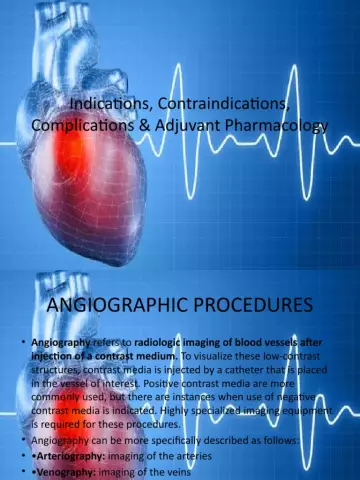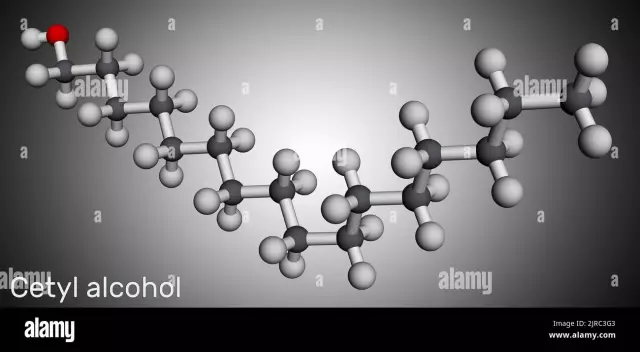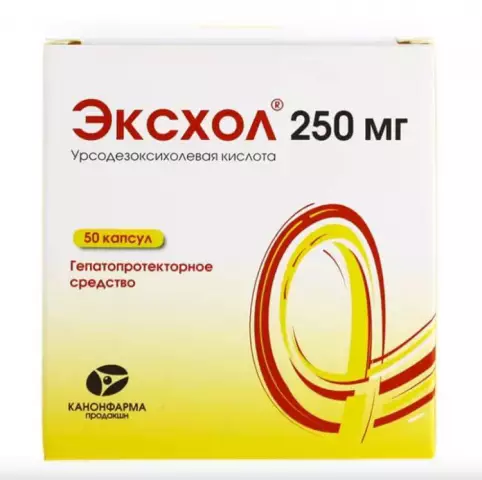- Author Rachel Wainwright wainwright@abchealthonline.com.
- Public 2023-12-15 07:39.
- Last modified 2025-11-02 20:14.
Glucocorticosteroids
Instructions for use:
- 1. Effect on the body
- 2. Main effects
- 3. Treatment
- 4. Contraindications

Glucocorticosteroid is a substance of natural or synthetic origin from the subclass of adrenal cortex hormones.
The effect of glucocorticosteroids on the body
By their chemical nature, these substances are steroids. In humans and animals, the main place of their formation is the adrenal cortex. Glucocorticosteroids generally increase the body's resistance to stress, this is precisely the biological significance of these hormonal substances.
Glucocorticosteroids affect the body's metabolism, mainly carbohydrate, mineral, protein and water.
Artificially created drugs of glucocorticosteroids act as anti-inflammatory, desensitizing, immunosuppressive, antitoxic and anti-shock agents.
The main effects of glucocorticosteroids
Glucocorticosteroids realize their effect, penetrating diffusely through cell membranes into the cytoplasm. There they bind to special intracellular receptors, through which they influence protein synthesis. It is also known about the inhibitory effect of these hormones on phospholipase A2 and hyaluronidase, which are enzymes of inflammation.
Substances of this group stabilize cell membranes, thereby inhibiting the release of biologically active substances (histamine, leukotrienes, thromboxane) from mast cells. They slow down the formation of pro-inflammatory cytokines from arachidonic acid.
The immunosuppressive effect of glucocorticosteroid hormones is used in medicine to suppress the excessive aggression of the immune system directed at its own body. This is required for organ transplants (for example, kidneys, bone marrow), for malignant tumors, and autoimmune diseases. The positive effect of treatment with glucocorticosteroids is achieved by suppressing the migration of stem cells and lymphocytes, as well as the interaction of different groups of lymphocytes with each other.
The ability of glucocorticosteroids to increase blood pressure is realized by increasing the release of adrenaline and restoring the sensitivity of adrenaline receptors to it, narrowing the lumen of blood vessels and reducing their permeability. This property allows them to deal with shock states in critical situations.
Glucocorticosteroids increase the formation of glucose in the liver and the breakdown of proteins, thereby increasing the content of free amino acids and glucose in the blood. At the same time, the body receives a sufficient amount of high-energy substances.
Treatment with glucocorticosteroids
In medicine, glucocorticosteroid preparations are divided into 3 groups according to the duration of action: short, medium duration and long-acting.
Short-acting glucocorticosteroids include hydrocortisone. This is an analogue of the body's own hydrocortisone, in comparison with other drugs, it has a minimal effect on water-salt metabolism.
Medium-acting glucocorticosteroid drugs are methylprednisolone and prednisolone.
Long-acting glucocorticosteroids include betamethasone and dexamethasone.

In the treatment of glucocorticosteroids, forms of drugs for oral administration, inhalation, intranasal and parenteral are used.
Oral preparations are well absorbed from the digestive tract, in the blood they bind to plasma proteins. They are used to treat congenital dysfunction of the adrenal cortex, primary and secondary adrenal insufficiency, with subacute thyroiditis, Crohn's disease, interstitial lung disease, and acute COPD.
Of the inhaled glucocorticosteroids, budesonide, triamcinolone acetonide, beclomethasone dipropionate, mometasone furoate, fluticasone propionate are most often used. They are well suited for the basic treatment of bronchial asthma and COPD, allergic rhinitis.
Intranasal glucocorticosteroids are prescribed for nasal polyposis, allergic and idiopathic rhinitis. The peculiarity of their introduction suggests that part of the drug will enter the nasal mucosa and into the respiratory tract, and some will be swallowed and enter the digestive tract.
Contraindications to glucocorticosteroids
They are used with caution in Itsenko-Cushing's disease, diabetes mellitus, thromboembolism, peptic ulcer, high blood pressure, severe renal failure, herpes and systemic mycoses.
Also contraindications to glucocorticosteroids will be active forms of syphilis and tuberculosis, pustular processes on the skin, viral eye lesions, corneal lesions with epithelial defects, glaucoma, breastfeeding period.
Intranasal glucocorticosteroids should not be administered for recurrent nosebleeds, hemorrhagic diathesis, and individual intolerance.
During treatment with glucocorticosteroids, measles and chickenpox are more severe.
Information about the drug is generalized, provided for informational purposes only and does not replace the official instructions. Self-medication is hazardous to health!






